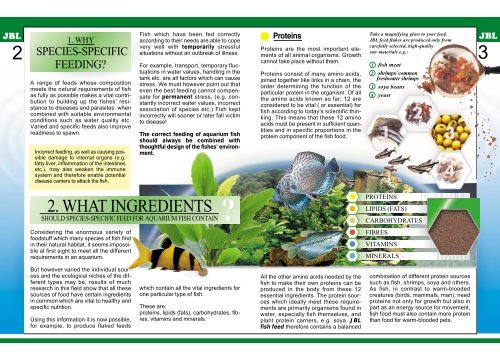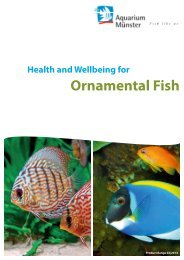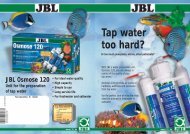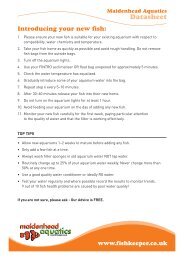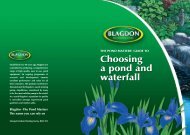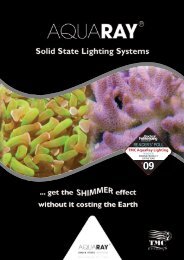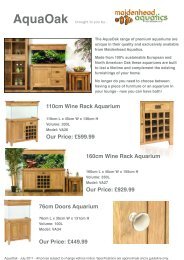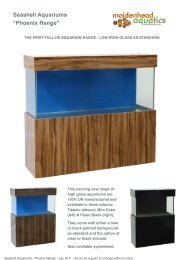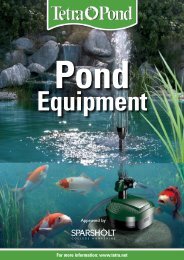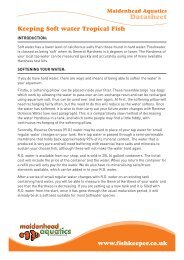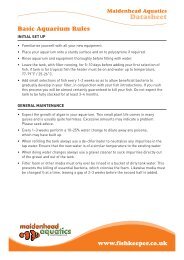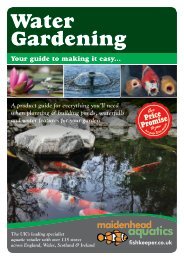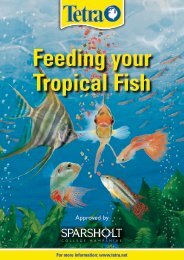Correct Feeding of Aquarium Fish(7.17MB)
Correct Feeding of Aquarium Fish(7.17MB)
Correct Feeding of Aquarium Fish(7.17MB)
You also want an ePaper? Increase the reach of your titles
YUMPU automatically turns print PDFs into web optimized ePapers that Google loves.
2<br />
1. WHY<br />
SPECIES-SPECIFIC<br />
FEEDING?<br />
A range <strong>of</strong> feeds whose composition<br />
meets the natural requirements <strong>of</strong> fish<br />
as fully as possible makes a vital contribution<br />
to building up the fishes' resistance<br />
to diseases and parasites, when<br />
combined with suitable environmental<br />
conditions such as water quality etc.<br />
Varied and specific feeds also improve<br />
readiness to spawn.<br />
Incorrect feeding, as well as causing possible<br />
damage to internal organs (e.g.<br />
fatty liver, inflammation <strong>of</strong> the intestines<br />
etc.), may also weaken the immune<br />
system and therefore enable potential<br />
disease carriers to attack the fish.<br />
2. WHAT INGREDIENTS<br />
SHOULD SPECIES-SPECIFIC FEED FOR AQUARIUM FISH CONTAIN<br />
Considering the enormous variety <strong>of</strong><br />
foodstuff which many species <strong>of</strong> fish find<br />
in their natural habitat, it seems impossible<br />
at first sight to meet all the different<br />
requirements in an aquarium.<br />
But however varied the individual sources<br />
and the ecological niches <strong>of</strong> the different<br />
types may be, results <strong>of</strong> much<br />
research in this field show that all these<br />
sources <strong>of</strong> food have certain ingredients<br />
in common which are vital to healthy and<br />
specific nutrition.<br />
Using this information it is now possible,<br />
for example, to produce flaked feeds<br />
<strong>Fish</strong> which have been fed correctly<br />
according to their needs are able to cope<br />
very well with temporarily stressful<br />
situations without an outbreak <strong>of</strong> illness.<br />
For example, transport, temporary fluctuations<br />
in water values, handling in the<br />
tank etc. are all factors which can cause<br />
stress. We must however point out that<br />
even the best feeding cannot compensate<br />
for permanent stress, (e.g. constantly<br />
incorrect water values, incorrect<br />
association <strong>of</strong> species etc.) <strong>Fish</strong> kept<br />
incorrectly will sooner or later fall victim<br />
to disease!<br />
The correct feeding <strong>of</strong> aquarium fish<br />
should always be combined with<br />
thoughtful design <strong>of</strong> the fishes' environment.<br />
?<br />
which contain all the vital ingredients for<br />
one particular type <strong>of</strong> fish.<br />
These are:<br />
proteins, lipids (fats), carbohydrates, fibres,<br />
vitamins and minerals.<br />
Proteins<br />
Proteins are the most important elements<br />
<strong>of</strong> all animal organisms. Growth<br />
cannot take place without them.<br />
Proteins consist <strong>of</strong> many amino acids,<br />
joined together like links in a chain, the<br />
order determining the function <strong>of</strong> the<br />
particular protein in the organism. Of all<br />
the amino acids known so far, 12 are<br />
considered to be vital ( or essential) for<br />
fish according to today's scientific thinking.<br />
This means that these 12 amino<br />
acids must be present in sufficient quantities<br />
and in specific proportions in the<br />
protein component <strong>of</strong> the fish food.<br />
All the other amino acids needed by the<br />
fish to make their own proteins can be<br />
produced in the body from these 12<br />
essential ingredients. The protein sources<br />
which ideally meet these requirements<br />
are primarily organisms found in<br />
water, especially fish themselves, and<br />
plant protein carriers, e.g. soya. JBL<br />
fish feed therefore contains a balanced<br />
Take a magnifying glass to your feed.<br />
JBL feed flakes are produced only from<br />
carefully selected, high-quality<br />
raw materials e.g.:<br />
1 fish meat<br />
2 shrimps/ common<br />
freshwater shrimps<br />
3 soya beans<br />
4 yeast<br />
PROTEINS<br />
LIPIDS (FATS)<br />
CARBOHYDRATES<br />
FIBRES<br />
VITAMINS<br />
MINERALS<br />
combination <strong>of</strong> different protein sources<br />
such as fish, shrimps, soya and others.<br />
As fish, in contrast to warm-blooded<br />
creatures (birds, mammals, man), need<br />
proteins not only for growth but also in<br />
part as an energy source for movement,<br />
fish food must also contain more protein<br />
than food for warm-blooded pets.<br />
3


